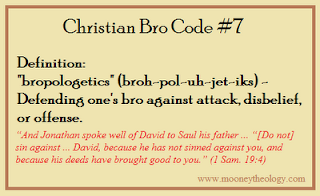The "Bro Code" is one of those unwritten sets of laws chiseled into the hearts of men everywhere. While many have attempted to write it down, there is no authoritative canon of the Bro Code, and it remains as hard to grasp as oil and wind. As the Apostle Paul attempted to "take captive every thought to make it obedient to Christ," so I am attempting to take the Bro Code and make it obedient to Christ. (2 Cor. 10:5)
I found this to be necessary after thumbing through The Bro Code by Barney Stinson, the reprehensible fictional character on How I Met Your Mother. (For a related post on How I Met Your Mother, read here.) There is definitely a code that exists among Christian "bros," but it is not Barney Stinson's amoral version of it. The goal here is to discover what principles already exist on Christian bros.
Below are a few articles that my students and I came up with toward a definitive Christian Bro Code:
- Bros before harlots. Thou shalt hold thine bro accountable to only courting righteous ladies. (Leviticus 21:14, KJV)
- Replace thine bro's toilet paper if thou uses the last square. (Matthew 7:12)
- Never covet thine bro's lady. (Exodus 20:17)
- Reverse dibs: When two bros doth see a righteous Christian lady that they both would like to court, the righteous bro will concede to the other. (Matthew 19:30)
- [Addendum: The second bro is under no obligation to then insist on a second reverse-dibs. The matter is finished.]
- A proper Christian wingman's job is to help his bro cleave to a Proverbs 31 woman. (Proverbs 31:10ff)
- Thou shalt not sit in an empty pew space next to another bro unless thou can sit in a relaxed disposition without touching thine brother's shoulders or thighs.
- [Addendum: This article may be abrogated during Easter and Christmas services with large numbers of visitors.]
- Definition: "bropologetics" (broh-pol-uh-jet-iks) -- defending one's bro against attack, disbelief, or offense. (1 Samuel 19:4)
- Bros do not share hymnals, but bros may share Bibles as long as their hands do not touch.
- Thou shalt only date ladies of such modesty that they will not cause thine fellow bros to lust in thine hearts. (1 Tim. 2:9; Col. 3:5; Matt. 5:28)
- Thou shalt treat a bro's mother with the same dignity, honor, and respect that thou shalt treat thine own mother. (Exodus 20:12; John 19:26-27)
- Bros shall never use emoticons on @Twitter, especially when tagging other bros. #ChristianBroCode
- When a bro is preaching, thou must always affirm him with an "Amen, bro." (Eph. 4:29)
- Acceptable "bro" nicknames include: Broseph, Brosephus, Bropocalypse, Bronabas, Brobednago, Brotholomew, Bronesimus, Bromothy, Broliath, Brolijah, and Broaz.
- A bro shall not allow another bro to declare any meat unclean, especially bacon. (Romans 14:16)
- Bros shalt not say "YOLO" ... ever. (John 3:3)
- When selecting one's bros, diversity of race and socioeconomic status is acceptable and encouraged. (Leviticus 25:35; Galatians 3:28)
- When selecting bros, a few is better than many. Facebook is not conducive to becoming bros. (Prov. 18:24, ESV)
- Thou shalt not hassle thy bro with foolishness, lest thou spoil the bromance. (Titus 3:9) [contributed by Mike Blissett of Chicago]
- [NEW] Thou shalt not engage in any wager involving currency. But a friendly laying of odds involving man points, honor, or silly feats of humiliation is acceptable. (1 Timothy 6:10) [contributed by Steve Houser of Songtan, South Korea]
- [NEW] Thou shalt peruse thine bro's library upon entering his abode, find one book with which thou disagree, and smite him. It is for thine bro's good. (Titus 1:10-16) [contributed by Steven Houser of Songtan, South Korea]
- [NEW] Thou shalt periodically engage in sword fights with thine bros--both figurative and literal. (Proverbs 27:17) [contributed by Jason Lantz of Songtan, South Korea]
- [NEW] Thou shalt always require thine bros to provide tangible proof of their boasted accomplishments, particularly ones highlighting bravery or heroism (John 20:25) [contributed by Jason Lantz of Songtan, South Korea]
[Note: The Christian Bro Code is the brainchild of my 4th period philosophy class-Hailey, Karalee, Hannah, Griffin, Luke, Shane, Mark, and Will. Thanks, class. You're good bros.]
-------------------------------------------------------





